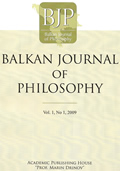Understanding Plato’s theory of justice and creating social order
Understanding Plato’s theory of justice and creating social order
Author(s): Chris Tasie OsegenwuneSubject(s): Philosophy
Published by: Институт по философия и социология при БАН
Keywords: Plato’s theory of justice; social order; morality; political philosophy
Summary/Abstract: Plato’s theory of justice is central in philosophical discourse. The canon of this theory is that every individual has an innate ability that can be harnessed to contribute to national development. Plato is of the view that grounding human ability in departmental excellence will promote a division of labour and enhance productivity, efficiency and effectiveness. Plato’s defense of justice is an attempt to correct the position of the sophists that injustice is preferred to justice. The Republic (Ideal state), one of his greatest dialogues, demonstrates the necessity of adopting a universal notion of justice as an instrument of social and moral regulation. Justice means one man, one job based on ones capacity and capability. Criticisms have trailed this theory as the forerunner of authoritarianism and despotism. The strongest criticism sees Plato’s paradigm as the enemy of the open society as a result of the strict division of society into dominant classes.
Journal: Balkan Journal of Philosophy
- Issue Year: III/2011
- Issue No: 2
- Page Range: 205-212
- Page Count: 8
- Language: English

